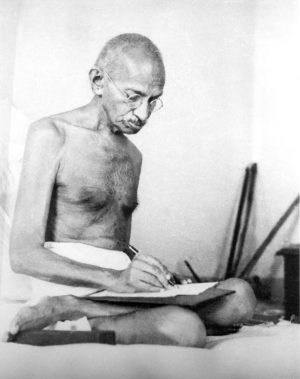Mahatma Gandhi was known for his nonviolent opposition to violence and his deep spirituality. He believed it was wise for a person to judge others by their faith instead of his own, maintaining that it was healthy for Hinduism to be interconnected with other religions, especially Christianity. Gandhi thought that this interconnectedness would only increase the faithful’s sources of inspiration for goodness. He believed that a person of faith should reverently study other people’s faith and that this would not diminish in any way a person’s convictions about his religion. The common denominator of moral convictions was what appealed to Gandhi, and this, he believed, should replace dogma. He viewed religion not only as being in line with reason but also expected it to help people in their everyday morality.
Gandhi once stated that he had no right to speak about other religions in a negative light or to draw attention to their flaws. He said that he could only come to the understanding that all religions are equal if he examined them with equal respect. However, when it came to Hinduism, he claimed that it was his duty and right to criticize it and keep it clean and unadulterated. Gandhi was not sympathetic to non-Hindu critics who pointed out flaws in Hinduism. He viewed them as displaying their lack of understanding of Hinduism and their inability to understand things from the standpoint of Hinduism. Gandhi explained that these observations kept him from criticizing other religions, such as Christianity and Islam. Gandhi also stated that anyone who wants to believe in the Bible is free to do so while not disparaging his former religion.
While Gandhi accepted Jesus as the expression of the spirit of God, he could not believe that Jesus was the only Son of God who assumed an earthly body. He argued that if Jesus was God himself, then it should follow that all would be like God. He looked up to Jesus as the only person who had uniquely expressed God and his will and that Jesus’ example was not restricted to Christianity but belonged to all humanity.
Gandhi could not agree that the Vedas have sole authority as God’s word because if that were the case, then the Bible and the Koran could also make the same claim. He spoke of the New Testament in a highly reverent tone. He noted that the New Testament comforted him and gave him immense happiness. He explained that if he were unable to read the Bhagavad Gita ever again and forgot its texts, he could draw the same happiness from the Sermon on the Mount.
In his deepest convictions, Gandhi held that all major religions revealed the same great truths and that all people of all faiths should respect other faiths and not just tolerate them. All religions come from the same source of truth, but their errors are only a result of imperfect humans who received the inspiration.
Gandhi thought that it was wiser for anyone planning to convert to another faith to simply renew and intensify his faith. Initially, Gandhi was not impressed with Christianity, but when he read the New Testament and the Sermon on the Mount, he was filled with joy by Jesus’ renunciation of worldly passions.
Gandhi expressed his views about atheists and stated that they were people who were carried away by the power of reason and became convinced that they had no use for religion. However, he quickly clarified that he himself does not accept religious teachings that contradict reason and are in opposition to morality. He argued, for example, that one cannot talk about God and be cruel to others at the same time.
